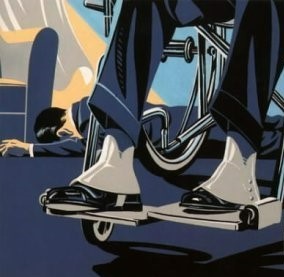My literary relationship with Thomas Mann was a strained one. I have read his Buddenbrooks and The Magic Mountain, and while I appreciate his excellence as an author, I didn’t truly enjoy them. I always felt a distance from him. Then I read the letters, exchanged between him and Hermann Hesse, and got a better understanding of the man inside the author. Maybe that was the turning point, but The Death in Venice presented quite a different side of Mann to me. If I say I was mesmerized by the beautiful prose with which he wrote this tragic story, I’m not exaggerating.
Death in Venice is about an acclaimed middle-aged writer who succumbs to passion later in life. Gustav von Aschenbach is a prolific writer whose life is devoted to discipline, reason, and art. He is an ascetic who lives a rigid life as dictated by convention. He is successful and content. Yet now in his fifties, the monotonous workaholic life is weighing upon him, and he decides to take a vacation. After visiting a few unsatisfactory destinations, he arrives in Venice, where unknown to him a tragic adventure of passion awaits him. This disciplined and rational man falls in love with a fourteen-year-old adolescent boy thus unleashing a passion that he cannot suppress, and by which he risks his life and embraces death.
The story is a beautifully written tragedy. The same-sex love that centered the story makes this novel part of the canon of gay literature. Yet, at no point does Mann resort to any erotic form or action to describe Aschenbach’s infatuation with the young boy. Rather, he falls back to Greek mythology and the relationship between Socrates and Phaedrus to communicate to the reader the strength of the passion of the middle-aged writer to this beautiful young boy. Mann’s choice of presenting the deeper feelings of Aschenbach in this manner captivated me. I was drowned in his words as he painted the inner torrent of the passion of this mature man: “He was drunk in both head and heart, and his steps followed the dictates of the demon whose delight it is to trample human reason and dignity underfoot”. Mann has written his character well that I didn’t find his actions ludicrous; I felt them human no matter how blind his actions were.
Mann’s writing came as a huge surprise to me. I never considered his writing to be beautiful; powerful and meaningful certainly, but beautiful was not an adjective with which I would have described his writing. Mann amazed me with the weaving of his words and demonstrating that he is in every way an excellent wordsmith. The emotions and actions of the protagonist are brilliantly captured through his wordplay: “But at that very moment he felt the casual greeting fade and vanish before the truth of his heart, he felt the rapture of his blood, the joy and agony of his soul, and acknowledged to himself that it was Tadzio who had made it so hard for him to leave.” The aged writer’s first acknowledgment to self that he was attracted to the boy is described thus, and he goes on to add: “He sat there perfectly still, perfectly invisible on his lofty perch, gazing within himself. His features were keen, his eyebrows high, his lips drawn into a vigilant, inquisitively intelligent smile. Then he raised his head and with both arms, which had been hanging limply over the back of his chair, made a slow, rising, circular motion that brought the hands forward in such a way as to indicate an opening and spreading of the arms”, demonstrating the complete surrender of the older man to the feeling of unconventional love towards a boy. Mann portrays the newborn love of the writer, adding a touch of the decadence of Venice thus symbolising the moral failure of the writer: “The incense billowing up and clouding the feeble flames of the altar tapers, and the sweet and stuffy sacrificial odor seemed to mingle with another: the odor of the diseased city. But through the haze and flicker, Aschenbach would see the beautiful boy turn his head, seek him out, and sight him.”
It is stated that Thomas Mann wrote this novella to demonstrate the tragic consequences that moral decadence and deviation from self-discipline and failure to suppress emotions would bring about. These were the conventional standards that judged the middle-class European society at Mann’s time. This may be true and I won’t argue the point. However, the descriptive beauty of human emotions at the new turn of events in the aged writer’s life said a different story to me: a story of being bold enough to follow one’s heart at the risk of being ridiculed, at risk of putting his life in jeopardy, to earn peace of mind, happiness, and emotional contentment.
This is the first Mann work that I truly and unreservedly enjoyed. It was simply a pleasure to indulge in Mann’s words as he took me through his protagonist’s emotionally fulfilling tragic journey. After reading his Buddenbrooks and The Magic Mountain, I felt I couldn’t connect with Mann’s work; there was somehow a distance between his stories and me. But Death in Venice reversed that feeling. I’m so glad that I decided to try one more of his works. The daring rewarded me amply.
Rating: 4/5



